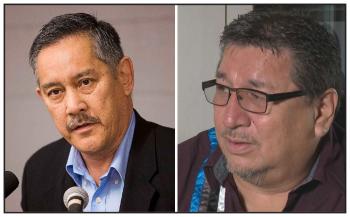Image Caption
Summary
Local Journalism Initiative Reporter
Windspeaker.com
Chiefs are worried about how the coronavirus pandemic may have slowed down applications for the McLean Federal Indian Day Schools settlement agreement. And they are concerned some applicants have had their claims downgraded. Chiefs are calling for an independent review.
The chiefs passed the resolution on Dec. 9, the final day of the Assembly of First Nations three-day virtual Special Chiefs Assembly. They’re calling for funding for the review and for a report to be delivered on the matter at the annual general assembly in July 2022.
In August 2019, the Federal Court approved the out-of-court McLean Indian Day School Settlement Agreement. It provides $10,000 in individual compensation and then additional compensation for further incidents of physical and sexual abuse, with amounts ranging from $50,000 to $200,000, based on the severity of the abuses suffered. There are five levels of compensation.
The deadline to file a claim is July 13, 2022. The resolution says that deadline should be extended by one year.
The present agreement allows for claimants to apply for a six-month extension.
Chief Mark Hill of the Six Nations of the Grand River, who moved the resolution, said COVID-19 had an impact on members who didn’t feel safe enough to leave their homes to make their applications. As well, many offices were closed.
Sagkeeng First Nation Chief Derrick Henderson also pointed out that many First Nations communities were in lockdown.
“Our fear is that it’s going to be too late when a member is now ready and eligible to do their claim. And that’s the other piece, right? Are they even ready to speak of that and, I think, that’s something we need further conversations with the correct people,” said Hill.
Seven months until the deadline does not present adequate time, said Henderson.
“People will be rushing in their claims and they’ll get denied and there will be no more room to move,” he said.
The agreement allows for individuals to appeal the decision on their claims.
Hill said members of his nation had been “under duress” and had applied for the lowest level of funding at $10,000, but now feel they should have applied for more.
Pimicikamak Cree Nation Chief David Monias said his people are also having their claims downgraded.
“Most of them are poor. They live in poverty, and they need the money. So they felt like they had no choice, they had no other recourse but to take the money, which I think is outrageous,” said Monias.
“Even some of the settlements that people had applied for were lowered. I don’t know who gives the authority to the people who are looking at these settlements, the authority to lower somebody’s claim. I always thought this process was going to be a lot easier than the other process that happened with the (Indian) residential school survivors,” said Henderson.
They say they want their members to be able to re-apply.
However, the claims administrator, according to information presented in the resolution, will not allow claimants to change levels or offer additional information, known as progressive disclosure, if they filed a claim prior to June 15, 2020.
The resolution calls for the settlement agreement to be amended to “remedy the decision to prohibit progressive disclosure by Day School Survivors.”
It also calls for “adequate resources” to be provided immediately to survivors so they can prepare and file their claims. Funding for local mental health support, technical support, and legal support of their choice is also being sought.
An amendment was added to the original resolution and called for an addition to Schedule K, which lists the day schools covered under the settlement. That amendment seeks to open compensation to Indian children whose education was “arranged and paid for by Indian Affairs” to attend neighbouring provincial schools.
Chief Roderick Gould of the Abegweit First Nation expressed concern that the amendment was “watering down” the original resolution, as Indian Affairs did not provide funding for Indigenous children to attend provincial schools. The amendment was initially targeting children on-reserve who were sent to provincial schools.
“If you start taking words out, you’re providing political loopholes for the future,” said Gould.
Beginning in the 1920s, about 200,000 Indigenous children attended federally operated and funded Indian Day Schools across the country. The agreement covers the period from Jan. 1, 1920 to the day the school closed, the day Canada no longer managed or controlled it, or the day Canada offered to transfer the school to the First Nation, even if the First Nation did not accept the transfer.
Chief Ralph Leon of Sts'ailes Nation questioned the start date and said the cut-off date impacted about 100 of his band members. The Chehalhis day school, which the members of Sts'ailes Nation would have attended, opened Oct. 1, 1916, and was transferred between June 1978 and September 1980, according to Schedule K of the agreement.
“That was very disheartening and very hard for them to continue on with their healing. We need a way of helping them, assisting them in their healing,” Leon said, pointing out that these students “had the same abuse as the rest of us.”
The settlement agreement also created a $200 million legacy fund. Work by the McLean Day Schools Settlement Corporation continues as to what that fund will look like and what it will do. That work was delayed because of measures to fight the spread of the coronavirus.
Local Journalism Initiative Reporters are supported by a financial contribution made by the Government of Canada.

